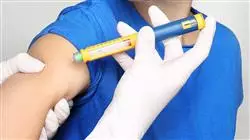University certificate
The world's largest faculty of medicine”
Description
Improve your knowledge through this program, where you will find the best didactic material with real clinical cases. Learn here about the latest advances in the specialty to be able to perform a quality medical practice"

This program offers the student the possibility of expanding and updating knowledge in Clinical Nutrition, using the latest educational technology. It offers a global vision of Child Nutrition while focusing on the most important and innovative aspects of feeding during the pediatric age, including the intrauterine phase to adolescence, as well as the diseases in which feeding plays a highly relevant role.
This program provides specialization in the field of Child Nutrition in areas of particular interest such as:
- Nutrigenetics
- Nutrigenomics
- Nutrition and obesity
- Hospital dietetics
- Nutritional Tendencies
This postgraduate diploma is methodologically designed for distance learning in order to guarantee optimal supervision.
With this specialization you will have the opportunity to take a program that compile the most advanced and in-depth knowledge in the field, where a group of highly regarded professors with extensive international experience provides you with the most complete and up-to-date information on the latest advances and techniques in Pediatric Endocrinology and Nutrition in Medicine.
Increase your skills in the approach to endocrinology and child nutrition care through this postgraduate diploma”
The postgraduate diploma in Pediatric Endocrinology and Nutrition in Medicine contains the most complete and up-to-date scientific program on the market. The most important features of the program include:
- The graphic, schematic, and eminently practical contents with which they are created contain information that is indispensable for professional practice
- It contains exercises where the self-assessment process can be carried out to improve learning
- Algorithm-based interactive learning system for decision-making for patients with feeding problems
- All of this will be complemented by theoretical lessons, questions to the expert, debate forums on controversial topics, and individual reflection assignments
- Content that is accessible from any fixed or portable device with an Internet connection
This postgraduate diploma may be the best investment you can make in the selection of a refresher program for two reasons: in addition to updating your knowledge of Pediatric Endocrinology and Nutrition in Medicine, you will obtain a postgraduate diploma from the Spanish educational institution, TECH Technological University”
Its teaching staff includes renowned specialists in nutrition based on clinical practice, who bring the experience of their work to this training.
The multimedia content developed with the latest educational technology will provide the physician with situated and contextual learning, i.e., a simulated environment that will provide immersive training programmed to train in real situations.
Problem-Based Learning underpins this program design, and the Doctor must use it to try to solve the different professional practice situations that arise throughout the course.
For this reason, you will be assisted by an innovative, interactive video system created by renowned and experienced experts in the field of nutrition who also have extensive teaching experience.
This postgraduate diploma provides training in simulated environments, which includes immersive learning designed to train professionals for real situations"

It includes clinical cases to bring the program's degree as close as possible to the reality of care in medicine"
Objectives
The main objective of the program is the development of both theoretical and practical learning, so that the Doctor can rigorously and practically master the study of Pediatric Endocrinology and Nutrition in Medicine.

This refresher program will provide you with a sense of confidence in your work as a doctor, which will help you grow both personally and professionally”
General Objectives
- Update the physician's knowledge of new trends in human nutrition, both in terms of health and pathological situations through evidence-based medicine
- Promote work strategies based on the practical knowledge of the new trends in nutrition and its application to adult pathologies, where nutrition plays a fundamental role in treatment
- Encourage the acquisition of technical skills and abilities through a powerful audiovisual system, and the possibility of development through online simulation and/or specialization workshops
- Encourage professional stimulation through ongoing training and research
- Train the professional for research into patients with nutritional problems
Specific Objectives
- Analyze the different methods for assessing nutritional status
- Interpret and integrate anthropometric, clinical, biochemical, hematological, immunological, and pharmacological data in the patient's nutritional assessment and dietary-nutritional treatment
- Early detection and evaluation of quantitative and qualitative deviations from the nutritional balance due to excess or deficiency
- Describe the composition and utilities of new foods
- Explain the relationship of physiology and nutrition in the different stages of infant development
- Analyze the implications of nutrition in the growth process and in the prevention and treatment of different childhood pathologies
- Describe the nutritional requirements in the different periods of childhood
- Perform nutritional assessment in pediatrics
- Evaluate and prescribe physical activity as a factor involved in nutritional status
- Calculate child and adolescent athlete dietary needs and risks
- Explain current trends in the nutrition of infants with delayed intrauterine growth and the implication of nutrition on metabolic diseases
- Reflect on the role of human milk as a functional food
- Describe new formulae used in infant feeding
- Reflect on new trends and models in infant feeding
- Reflect and identify risk factors in school and adolescent nutrition
- Incorporate the different techniques and products of basic and advanced nutritional support related to pediatric nutrition into clinical practice
- Identify children at nutritional risk who are eligible for specific support
- Evaluate and monitor the supervision of children on nutritional support

Take the opportunity and take the step to get up-to-date on the latest developments in Pediatric Endocrinology and Nutrition in Medicine”
Postgraduate Diploma in Pediatric Endocrinology and Nutrition in Medicine
One of the main axes in the pediatric branch is the supervision of the growth and development of patients, this is achieved through regular monitoring of all the infant's habits (feeding, physical activities), in order to evidence any abnormality in time. This requires professionals to renew their knowledge in order to provide users with the latest health care. For this reason, at TECH Technological University we designed together with the best specialists, a course of Postgraduate Diploma in Pediatric Endocrinology and Nutrition in Medicine; focused on support nutrition to avoid pathologies such as diabetes, thyroid, adrenal and pituitary problems, among others. The program is taught in 100% online mode, its structure was designed using new educational technologies and the curriculum includes an extensive repertoire focused on the fundamental concepts of the area. Through dynamic lessons supported by multimedia material, you will specialize in key aspects such as nutrigenetics/nutrigenomics, hospital dietetics and nutritional trends, followed by methods for assessing energy expenditure and food support. In this way, you will be able to identify possible cases of child malnutrition or endocrinological disorders.
Specialize in nutrition and endocrinology in children
The Postgraduate Diploma offered by the TECH School of Medicine is methodologically designed for you to obtain immersive learning completely remotely. You will reinforce your training with practical exercises in simulated environments, which will allow you to cope with solvency possible hospital situations that arise. Throughout the six months of the program, you will learn the global vision of nutrition in the pediatric age (from the intrauterine phase to adolescence), as well as the diseases in the analysis of anthropometric, biochemical, hematological, immunological and pharmacological data in the dietary-nutritional assessment. Due to this, you will manage to identify minors with susceptible nutritional risks or imbalances that need specific support; in addition, you will obtain the necessary competencies to treat pathologies present in this age group such as dyslipidemias, diabetes, nephropathy, chronic lung disease and allergy and/or food intolerance.







